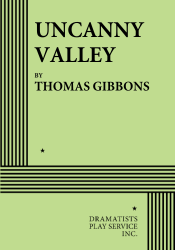Uncanny Valley - ePublication
THE STORY: Drawing on current research in artificial intelligence and robotics, UNCANNY VALLEY charts the relationship between Claire, a neuroscientist, and Julian, a nonbiological human. As Julian is “born” a few body parts at a time over the course of the play, Claire teaches him how to be as human as possible: mirroring people’s speech, engaging in small-talk, playing a musical instrument. Their deepening friendship and Julian’s growing “humanity” lead to the revelations of an unhealed sorrow in Claire’s personal life and, ultimately, the purpose for which Julian has been created. UNCANNY VALLEY explores the painful divide between creator and creation, the inherent unpredictability of consciousness, and how we are redefining what it means to be human in the twenty-first century.
“…cerebrally challenging…Gibbons creates a fascinating scenario. The questions the play raises—can, for instance, a robot’s consciousness attain a level of sophistication that qualifies as sentience?—compel one to consider whether like the Tin Man, a manufactured being might actually someday possess a heart.…until the very last blackout, we remain tantalized by the mystery of what courses through Julian’s circuitry.” —Washington Post.
“…Thomas Gibbons’s futuristic two-hander UNCANNY VALLEY [is] a techno take on the Pinocchio story: [Julian] is only a simulated human, and there may be a void where his ethical compass ought to be. But we’re sort of rooting for him just the same.” —The New York Times.
“[A] riveting exploration of robotics and the relationship between the creator and the creation…The reversals and inversions explored in UNCANNY VALLEY play tricks with your head—when Claire goes into clipped professional mode, in contrast, Julian becomes touchingly human. But what does that mean? Is feeling and emotion what makes us human? Or is it the act of creation—to take an idea, a divine spark and make it real?” —DC Theatre Scene.
